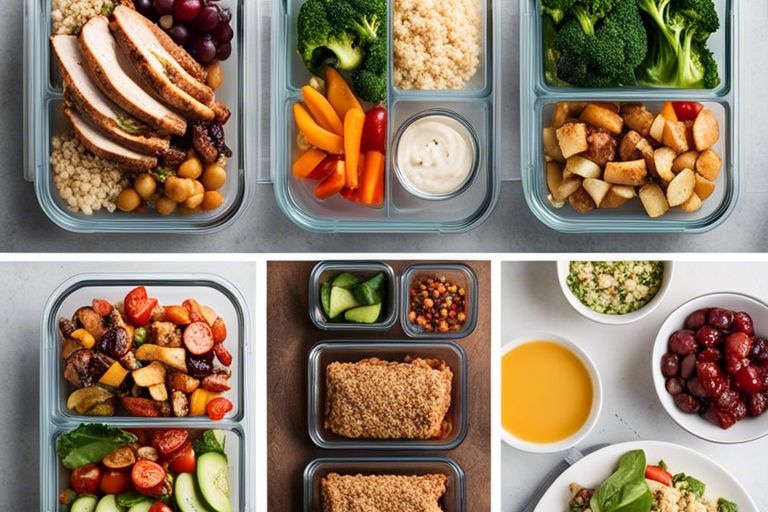
Can Meal Prepping Help You Shed Pounds? What Are Some Beginner Tips?
Embarking on a weight loss journey can be overwhelming for many individuals, but meal prepping can be a helpful tool in achieving your fitness goals. By preparing your meals in advance, you can easily manage portion control, nutrient intake, and caloric intake. In this guide, we will explore the benefits of meal prepping for weight loss and provide some beginner tips to help you get started on your health and fitness journey.
Key Takeaways:
- Meal prepping can aid in weight loss: Planning and preparing your meals in advance can help you make healthier choices and control portion sizes, which can lead to weight loss.
- Focus on balanced meals: When meal prepping, make sure to include a good balance of protein, healthy fats, and complex carbohydrates to keep you satisfied and properly nourished.
- Start simple: As a beginner, start with easy meals and snacks that you enjoy and are familiar with. Gradually incorporate new recipes and ingredients as you become more comfortable with meal prepping.
- Invest in quality containers: Having reliable containers for storing your prepped meals is essential. Look for containers that are durable, leak-proof, and microwave-safe.
- Stay organized: Set aside dedicated time each week for meal prepping and create a meal plan to help guide your prep. Keeping a well-stocked pantry and fridge can also make the process smoother.


The Types of Meal Prepping Methods
Now, let’s explore the different meal prepping methods you can choose from to help you shed pounds effectively:
| Batch cooking | Preparing large quantities of food at once to use throughout the week |
| Portion control meal prep | Dividing meals into individual servings to control portion sizes |
| Ready-to-eat meal prep strategies | Creating meals that can be stored and eaten without any additional preparation |
| Freezer meal prep | Prepping meals specifically designed to be frozen and reheated later |
| Salad jar meal prep | Assembling salads in portable jars for quick and easy grab-and-go meals |
Batch cooking
Batch cooking involves dedicating a few hours of your weekend to cooking multiple dishes in large quantities. This allows you to have meals ready to go for the entire week, saving you time and effort each day.
Portion control meal prep
One of the key aspects of portion control meal prep is ensuring that each meal is separated into individual servings, providing you with the right amount of food to support your weight loss goals. By controlling your portions in advance, you can prevent overeating and regulate your calorie intake effectively.
Methods for portion control meal prep can include using meal prep containers or meal planning tools to portion out your meals in advance, ensuring that you have the right balance of protein, carbohydrates, and vegetables in each serving.
Ready-to-eat meal prep strategies
The ready-to-eat meal prep strategy involves preparing meals that require little to no additional preparation or cooking before consuming. This can include prepping salads, assembling sandwiches, or creating complete meals that only need to be reheated.
Meal prep strategies can also include making use of already cooked and prepared ingredients, such as pre-cooked protein options or pre-cut vegetables, to streamline the process of putting together your meals.
Step-by-Step Guide to Starting Meal Prepping
Not sure where to start with meal prepping? Don’t worry, we’ve got you covered. Here is a step-by-step guide to help you get started on your meal prepping journey.
| Planning your meals | Grocery shopping tips for meal preppers |
Planning your meals
Planning your meals is the first step to successful meal prepping. Start by deciding what meals you want to prep for the week. Consider your goals, whether it’s weight loss, muscle gain, or simply eating healthier. Once you have an idea of your meals, make a detailed list of ingredients you will need.
Grocery shopping tips for meal preppers
Step by step grocery shopping is crucial for meal preppers. Make sure to plan your meals before going shopping, and stick to your list to avoid impulse buys. Choose fresh, whole foods and prioritize fruits, vegetables, lean proteins, and whole grains. After shopping, take the time to properly store your groceries to ensure they stay fresh throughout the week.
Starting your meal prepping journey can seem daunting at first, but with proper planning and guidance, it can become a seamless part of your routine. By following these step-by-step grocery shopping tips, you can make the process more efficient and enjoyable. After mastering the art of grocery shopping for meal prepping, you will be well on your way to achieving your health and fitness goals.
Prep, package, and store – The workflow
Starting the meal prepping process involves prepping, packaging, and storing your meals for the week. Allocate a specific day and time for prepping, and make sure to have all the necessary containers and storage options ready. Streamline your workflow by preparing multiple dishes at once, portioning them out, and storing them in the fridge or freezer.
This efficient workflow will save you time and effort throughout the week, giving you more control over your portion sizes and nutrition. By following this step-by-step guide, you can simplify the meal prepping process and set yourself up for success in achieving your health and fitness goals.

Factors Influencing Meal Prep Success
After researching and studying successful meal preppers, we have identified several key factors that can greatly influence the success of your meal prep journey. Recognizing and understanding these factors can help you make the necessary adjustments to ensure your meal prep experience is as effective and efficient as possible.
- Nutritional considerations: The nutritional content of your prepped meals plays a significant role in your weight loss journey. It’s important to focus on incorporating a balance of macronutrients, such as protein, healthy fats, and complex carbohydrates, to support your weight loss goals.
- Time management and scheduling: Efficiently allocating time for meal prepping and establishing a consistent schedule can greatly impact your ability to stay on track with your weight loss goals. Planning and organizing your meal prep sessions can help you avoid potential obstacles that may hinder your progress.
- Budgeting for meal prep: Carefully considering your allocated budget for meal prep ingredients and supplies can prevent overspending and ensure you are effectively managing your finances while pursuing your weight loss goals.
Nutritional considerations for weight loss
Influencing the nutritional content of your prepped meals is crucial for achieving your weight loss goals. It’s essential to prioritize including nutrient-dense foods that provide sustained energy and promote satiety, helping to curb unhealthy cravings and overeating.
Time management and scheduling
An efficient approach to time management and scheduling is key for successful meal prep and weight loss. Establishing a consistent routine for planning, grocery shopping, and prepping meals ahead of time can alleviate stress and save time throughout the week, enabling you to stay focused on your weight loss journey.
Weight loss is a journey that requires dedication and commitment to prioritizing healthy habits. By effectively managing your time and scheduling meal prep sessions, you can optimize your efforts and contribute to your overall success in achieving your weight loss goals.
Budgeting for meal prep
Considerations surrounding budgeting for meal prep play a significant role in ensuring financial stability while pursuing your weight loss goals. By carefully evaluating the cost of ingredients and meal prep supplies, you can effectively manage your financial resources and avoid overspending.
The cost-effective approach to meal prep can contribute to sustainable weight loss efforts, allowing you to prioritize high-quality ingredients and maintain financial stability throughout your journey.
Pros and Cons of Meal Prepping
To begin with, let’s take a look at the pros and cons of meal prepping. This will help you understand the potential benefits and challenges of incorporating meal prepping into your weight loss journey. For more detailed information, you can also check out Meal Prep 101 For Beginners.
| Pros | Cons |
| 1. Saves time | 1. Initial time investment |
| 2. Helps with portion control | 2. Risk of food spoilage |
| 3. Reduces decision fatigue | 3. Limited freshness of meals |
| 4. Promotes healthier eating choices | 4. Potential for repetition and boredom |
| 5. Cost-effective | 5. Requires storage space |
| 6. Minimizes food waste | 6. Can be challenging for beginners |
| 7. Can be tailored to dietary preferences | 7. Adapting to social events and spontaneity |
| 8. Enhances cooking skills | 8. Potential for rigidity and inflexibility |
| 9. Supports weight management | 9. Requires discipline and consistency |
Advantages of meal prepping for weight management
Prepping your meals in advance can be a game-changer when it comes to managing your weight. By having nutritious, portion-controlled meals readily available, you are less likely to succumb to unhealthy options or overeating. Additionally, meal prepping allows you to incorporate a variety of nutrient-dense foods into your diet, which can support your weight loss goals. With practice and dedication, meal prepping can empower you to make positive choices for your health.
Potential challenges and how to overcome them
Prospective challenges of meal prepping may include initial time investment, limited freshness of meals, potential for repetition and boredom, and adapting to social events and spontaneity. However, by planning your meals effectively, incorporating a diverse range of ingredients, experimenting with different cooking methods, and gradually introducing flexibility into your meal prepping routine, you can overcome these obstacles. This will ultimately transform meal prepping into a sustainable and enjoyable habit that supports your weight management journey.
Tips for Meal Prepping Beginners
Despite the initial overwhelm, meal prepping is an effective and efficient way to stay on track with your weight loss goals. Here are some essential tips for beginners to help you get started:
- Start small and simple
- Plan your meals and snacks
- Invest in good storage containers
Assume that with practice and dedication, you will soon become a meal prepping pro.
Simplifying your first meal prep experience
An easy way to simplify your first meal prep experience is to focus on preparing just one type of meal, such as grilled chicken with vegetables. This takes the pressure off and allows you to get comfortable with the process before tackling more complex recipes. Remember to keep it simple and gradually build up to more intricate meal plans as you gain confidence.
Maintaining variety in your diet
Your meal prep doesn’t have to be boring or repetitive. Incorporate a variety of proteins, vegetables, and grains to keep your meals interesting and nutritious. The key is to prepare different components that can be mixed and matched throughout the week, allowing for a diverse and satisfying eating experience.
The inclusion of healthy fats such as avocados, nuts, and seeds can also add a flavorful and satisfying element to your meals.
Essential tools and equipment for efficient meal prepping
To streamline your meal prepping process, invest in high-quality storage containers, a reliable food scale, and a variety of kitchen utensils such as sharp knives and cutting boards. These tools will not only make your meal prep more efficient but also ensure that your stored meals remain fresh and safe to consume.
Meal prepping can be made much easier with the use of specialized kitchen appliances such as a slow cooker, instant pot, or air fryer, which can help speed up the cooking process and diversify your meal options.

Can Meal Prepping Help You Shed Pounds? What Are Some Beginner Tips?
Summing up, meal prepping can indeed help you shed pounds by allowing you to control portion sizes and choose healthier, homemade options over processed, convenience foods. Some beginner tips for successful meal prepping include planning your meals for the week, investing in quality storage containers, and choosing a variety of fruits, vegetables, lean proteins, and whole grains. By incorporating these practices into your routine, you can set yourself up for success in reaching your weight loss goals through meal prepping.
Meal Prepping for Weight Loss FAQ
Q: Can meal prepping help you shed pounds?
A: Yes, meal prepping can be a helpful tool for weight loss. By preparing healthy meals in advance, you can better control portion sizes and make healthier choices, leading to potential weight loss.
Q: What are some beginner tips for meal prepping?
A: Start by planning your meals for the week, choosing simple recipes, and investing in good quality storage containers. It’s also important to think about variety and balance to ensure you’re getting all the nutrients you need.
Q: How can meal prepping help with portion control?
A: By portioning out your meals in advance, you can avoid overeating and make sure you’re consuming the right amount of food to support your weight loss goals. This can also help prevent mindless snacking throughout the day.
Q: What foods are best for meal prepping for weight loss?
A: Lean proteins, such as chicken, turkey, and fish, are great for meal prepping, as well as plenty of fruits and vegetables. Whole grains and legumes are also good choices for a balanced meal plan.
Q: How do I stay motivated to meal prep for weight loss?
A: Set realistic goals, stay organized, and track your progress to stay motivated. Find meal prep recipes you enjoy and involve friends or family to make it a social activity. Remember, consistency is key to seeing results.



